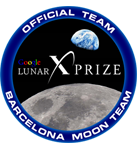High Resolution Images
Barcelona Moon Team: The New (American) CATALYST. News, News (eng)

Its good news for the Moon commercial ventures.
“NASA has released an announcement seeking proposals to partner in the development of commercial robotic lunar lander capabilities. Such capabilities could support commercial activities on the moon while enabling new science and exploration missions of interest to the larger scientific and academic communities. NASA’s new Lunar Cargo Transportation and Landing by Soft Touchdown (Lunar CATALYST) initiative calls for proposals from the U.S. private sector that would lead to one or more no-funds exchanged Space Act Agreements (SAA). The purpose of these SAAs would be to encourage the development of robotic lunar landers that can be integrated with U.S. commercial launch capabilities to deliver small and medium class payloads to the lunar surfaceâ€.
This announcement shows the growing interest of NASA to build on stronger partnerships with the commercial space industry, reaching and exploring the moon, looking for opportunities to spur commercial cargo transportation capabilities to the surface of the moon.
Such collaboration, even if it is not with direct funding, will be very interesting for the Google Lunar X PRIZE teams, which will benefit from NASA’s resources including NASA civil servant technical expertise, access to testing facilities, equipment loan, or software elements for the development and testing of the landers.
Yes, it’s good news for the American Moon commercial ventures and the American Google Lunar X PRIZE teams. Not so much for the rest of them. Only U.S. private-sector entities or proposals including at least U.S. entity as the lead proposer are eligible. In addition, proposals shall use U.S. commercial launch capabilities to reach the moon.
We applause NASA’s efforts to support the private initiatives to develop commercial robotic exploration, but we wonder whether this, again, unbalances the competition in favor of the American teams. Already in 2010, the Innovative Lunar Demonstration Data program launched awarded American GLXP teams only, including Astrobotic, Moon Express, Omega Envoy, and other teams that recently abandoned the competition or integrated into other teams.
Is ESA going to do something similarly? In June 2012, a conference in ESA-ESTEC invited the European teams to explain their projects. Team Italia, White Label Space and Barcelona Moon Team exposed their plans, and the meeting between Peter Diamandis and Franco Ongaro, Head of ESTEC, opened the door to ESA to take similar actions to support non-American teams. Nothing else happened since then.
USA 2 – Europe 0 (…and China already on the surface)















